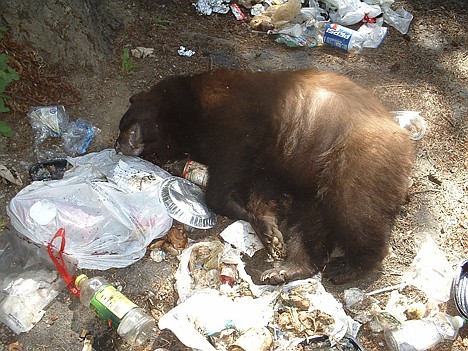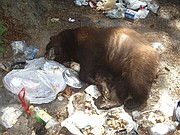Prohibition on wildlife feeding considered
SANDPOINT - The Idaho Department of Fish & Game is urging Bonner County to enact an ordinance which prohibits the feeding of wildlife, particularly bears.
"It's a public safety issue and it's a bear safety issue," said Becky Haag, an environmental biologist with Fish & Game.
Fish & Game conservation officers in Bonner County logged 770 nuisance bear calls from the public this year. Kootenai, Shoshone and Benewah counties combined had just 27, according to Fish & Game.
Many of the calls involved property damage to buildings, outbuildings, boats and vehicles, but none have resulted in injuries to humans.
"We've been dodging the bullet by nobody getting hurt," said Rob Soumas, a conservation officer who covers the Priest River and Priest Lake areas.
Fish & Game officials concede the call volume is unusually high because of a lackluster huckleberry crop year. Bonner County is also home to some of the highest-quality bear habitat in the state.
But the issue of unintentional and intentional feeding remains a perennial problem in Bonner County, Fish & Game biologists and conservation officers contend.
Bears are being drawn into neighborhoods by improperly secured trash containers, bird feeders, pet foods and backyard barbecues. Exacerbating the problem are people who are deliberately luring in bears with cracked corn and molasses-laced oats for their personal amusement.
While there have been no recent local human casualties, the dangerous mix of people and large omnivores has needlessly cut into bear populations.
Fish & Game was forced to take the extraordinary step of shooting at Selkirk grizzly bear - a threatened species - at Priest Lake in 2007 after relocation and numerous efforts failed to break its habit of seeking out food where people live. Such a fate has also befallen a number of black bears at Priest Lake.
Fish & Game has worked to educate landowners about the importance of properly stowing trash and feed, in addition to the dangers of bear baiting. It's also worked with resort owners at Priest Lake, Hope and Schweitzer Mountain to develop bear countermeasures.
But those efforts have had mixed results on the individual level. The message gets through to some landowners, but not others. Trish's Place in Hope took appropriate measures to avoid luring bears, but others nearby had not. The bear that broke into the business had scat entirely composed of birdseed.
"If you've got one person in a neighborhood that's still got the stuff out, it's a problem for the entire neighborhood," Soumas said.
Although Fish & Game's diplomatic efforts will continue, they have hit a wall in some cases.
"We've been asking and that's the problem. I think we're seeing that that's ineffective, unfortunately," Haag said. "Asking people to do things nicely isn't working."
Past and current Bonner County commissions are typically leery of enacting new ordinances, particularly if the problem can be addressed by existing law or other means.
But Fish & Game officials said there is nothing in Idaho Code which prohibits the feeding of wildlife. Other communities in the region, however, have adopted their own rules. Fernan Lake Village passed an ordinance prohibiting the practice, as did Missoula, Mont.
Commissioners agreed to take the request under advisement so they could look into the effectiveness of such ordinances in reducing human contact with wildlife and conduct other research. But the board expressed concern with the potential drag the ordinance could have on county law-enforcement resources.
Commission Chairman Joe Young said Bonner Dispatch will invariably take a bear nuisance call and if a conservation officer isn't available, it will fall into the lap of a deputy.
"It's going to be a call that they're going to be on when they can't take another call," Young said.
Sheriff Daryl Wheeler shares Young's concern and adds that if an ordinance is ultimately adopted, it should be prosecuted as an infraction rather than a misdemeanor. Those cited for infractions are not entitled to a publicly funded defense.
"If you cite somebody for a misdemeanor, they can have a public defender," Wheeler said.
Even if an ordinance is passed, Fish & Game officials said the primary focus will continue to be outreach and education. Prosecution would be a last resort for defiant scofflaws.
"The main thing we're looking for is to have that teeth so we can change that behavior for those individuals who don't want to be reasonable," said Ed Jochum, a conservation officer for the Sandpoint area.



